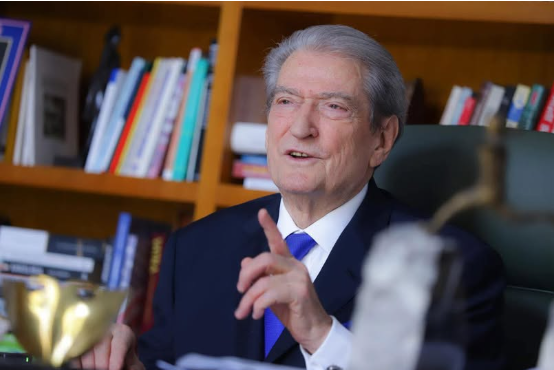Former Albanian Prime Minister Sali Berisha has renewed claims of election rigging following the May 11 municipal vote, calling the process a “farcical exercise dictated by organized crime.” In response, the ruling Socialist Party (PS) has dismissed Berisha’s accusations, releasing a video montage portraying his long history of election denialism dating back to the 1990s.
Berisha, the embattled leader of a faction within Albania’s Democratic Party (PD), has called for a mass protest on May 16 — the same day Tirana is set to host the
European Political Community (EPC) Summit. The date, he said, was intentionally
chosen to highlight what he described as the “electoral crimes” of Prime Minister Edi Rama’s government in front of European leaders. “This was not an election, but a falsified spectacle — a national disgrace,” Berisha declared during a press conference, citing alleged manipulation of diaspora ballots and the use of state force to influence results. “The will of the people was trampled. We do not and will not recognize the outcome of these stolen elections.”
The Socialist Party quickly countered with a response via social media, publishing a video compilation of Berisha’s statements over nearly three decades. The footage highlights how Berisha has repeatedly accused political opponents of fraud after each electoral defeat, including in 1997, 2013, 2021, and now 2025. “Every time he loses, the same narrative returns,” the video caption reads, featuring clips of Berisha calling elections a “massacre,” a “falsified process,” and “null and void.” The party labelled his rhetoric as “a well-worn script” intended to undermine institutions and mobilize unrest. According to PS, voters across Albania cast their ballots under fair conditions, and Berisha’s claims are aimed at delegitimizing the results rather than accepting political reality.
Protest Timed for Diplomatic Visibility
Berisha’s planned protest, which is scheduled to take place along Tirana’s main boulevard, comes at a moment of heightened visibility for the country, as leaders from across Europe converge for the EPC Summit. While Berisha vowed the protest would be peaceful and not endanger foreign dignitaries, he emphasized the symbolism of the date. “European leaders should not shake hands with an autocrat who wins by vote theft,” he said, referring to Prime Minister Rama. Berisha also criticized alleged irregularities in diaspora voting, claiming that after a visit from senior Socialist Party figures to Greece, the number of postal ballots surged suspiciously, overwhelmingly in favour of the ruling party.
The European Union and international observers have yet to release final assessments of the May 11 elections. Albania, a candidate for EU membership since 2014, remains under pressure to improve electoral transparency, judicial independence, and media freedom. Berisha, currently sanctioned by the U.S. for alleged corruption, remains a divisive figure in Albanian politics. His continued influence, coupled with accusations of election manipulation, raises questions about political stability in a country still navigating democratic consolidation. The coming days will test not only Albania’s electoral institutions but also its international image, as the nation hosts one of the most significant diplomatic gatherings in its post-communist history.
Written by our correspondent A.T.



